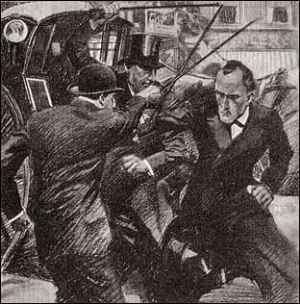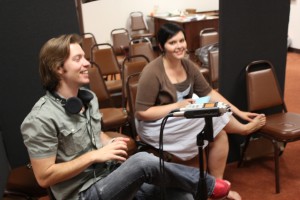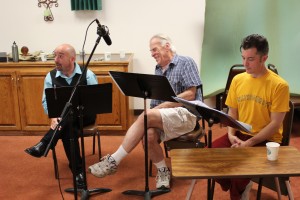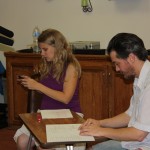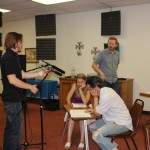When I first started adapting The Man Who Was Thursday it was in 2002, and my original notion was that the story was “ripe” for updating into a contemporary settings, especially since the 9/11 terrorist attacks, the world was wondering the same question: Why does God allow things to randomly blow up? Plus, I could recast the “anarchist” into our modern term for it: “Terrorist.” Of course, it also had to be a movie, since I’m a filmmaker. So the screenplay contemporary adaptation began.
However, two things happened: First, I fell in love with Chesterton’s witty banter. Second, I’m not that good of an adapter, judging by the fact that when I can’t think of anything original to add, I simply transcribe what dialog and action is in the book into screenplay format. What I ended up with was an unusual hybrid: an old-fashioned story with old-fashioned dialog that was trying to exist in today’s world. Another thing happened while I did that, however. I was still attempting to change the way people talk in the book to be a little more fluid and use phrases and words that we’re a little more used to today. So there were a number of things in the dialog I changed in the name of “updating” it.
As the years passed, I couldn’t let go of the original period setting in turn-of-the-century London. Plus I like the way the characters spoke, and I wanted to keep all of that great Chesterton dialog. As I approached the book to become this radio play, I started from two sources that I kept open on my computer as I wrote: The text of the book, and my contemporary film adaptation. I decided to meld the two, taking what I liked about my adaptation, and bringing it back into the original time setting.
Here is a line that I decided to keep in the radio script, even though it was modern usage of the words, and would never have been spoken at the time: Lucien Gregory says, “You have pissed me off, and I don’t usually get pissed!” “Really?” asks Gabriel. “Not too often,” replies Gregory, timidly.
“You have pissed me off” [click to listen]
Needless to say, this line caused a minor mutiny in the recording session. They didn’t buy it, and said it pulled them out of the time period. I argued for it. To me, anachronistic language doesn’t matter a whole lot. The purpose of the piece of art we’re making is to entertain the people of today, not to impress some historians with our accuracy. You see this approach all the time. My wife and I watched a wonderful translation of Moliere’s Tartuffe by Richard Wilbur that used all kinds of modern references an plays on words in order to make the English translation rhyme properly. Though for the record, my wife agrees with Jacob and Eric (who play the parts). “Pissed off” is just too colloquial slang to make it work in this case.
Here is what it became, and I do think it has a laugh of it’s own:
“You have irritated me” [click to listen]
Chime in in the comments below if you like the “before” or “after.” Oh, and you might be wondering what the original Chesterton dialog was. Here it is:
“Mr. Syme,” he said, “this evening you succeeded in doing something rather remarkable. You did something to me that no man born of woman has ever succeeded in doing before.”
“Indeed!”
“Now I remember,” resumed Gregory reflectively, “one other person succeeded in doing it. The captain of a penny steamer (if I remember correctly) at Southend. You have irritated me.”
“I am very sorry,” replied Syme with gravity.
There is still quite a bit of editing to go, so I apologize for those who are waiting to hear something. Stay tuned.

